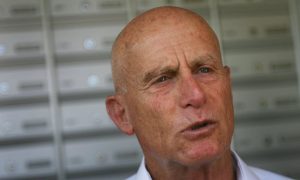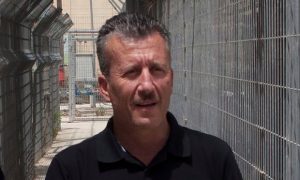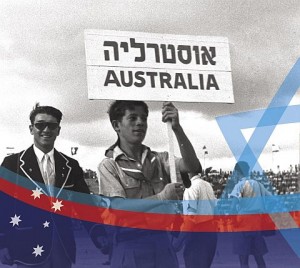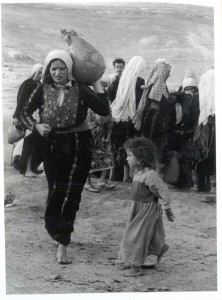Liberal defenders of free speech curiously silent over banning of Bassem Tamimi
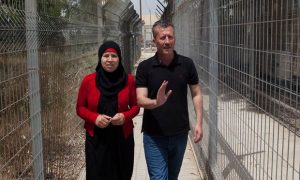 Less than a fortnight after the 18C debate inspired so many thunderous denunciations of censorship, the Liberals have been granted an opportunity to put their principles in practice, courtesy of an attack on free speech carried out by, well, by the Liberals, actually.
Less than a fortnight after the 18C debate inspired so many thunderous denunciations of censorship, the Liberals have been granted an opportunity to put their principles in practice, courtesy of an attack on free speech carried out by, well, by the Liberals, actually.
The Turnbull government has intervened to prevent the Palestinian activist Bassem Tamimi from lecturing in Australia, cancelling his visa just before he boarded a plane for a scheduled speaking tour.
The Department of Immigration and Border Protection justified the decision on the basis that “members of the public will react adversely” but then, in a nice touch, censored the detailed reasoning behind its censorship.
Read the full article in The Guardian
Israel sunk in ‘incremental tyranny’, say former Shin Bet chiefs
Two former heads of Israel’s powerful domestic intelligence service, the Shin Bet, have made an impassioned and powerful intervention ahead of events to mark the 50th anniversary of the country’s occupation of the Palestinian territories in June.
One of the pair warned that the country’s political system was sunk in the process of “incremental tyranny”.
Read the full article in The Guardian
Palestinian activist’s Australian visa cancelled on eve of speaking tour
The federal government has cancelled the visa of an outspoken Palestinian activist on the eve of his Australian speaking tour because others are likely to “react adversely” to his presence.
The activist, Bassem Tamimi, was due to board a plane this week to begin his Australian speaking tour, which was organised by the Palestine Action Group, Friends of Palestine, and The Social Research Institute. He was granted a visa on 4 April, but it was cancelled the next day.
Read the full article in The Guardian
Australia and Israel
A PICTORIAL ROMANCE
In 2008, Commonwealth of Australia recognised the 60th anniversary of the establishment of the state of Israel and the Department of Foreign Affairs (DFAT) published on its website “A Pictorial History” of the association between the two countries, which reads as a text book description of the formation of the typical settler colonial state. War and the valiant conquest of unidentified indigenous take up half the story, with Australia supposedly fighting for Israel against “the Turk and whatever other infidel holds (the land)”, thirty years before Israel’s establishment. In 1914, 525,000 Muslims easily outnumbered 94,000 Jews in Palestine. Australians weren’t fighting for Jews, they were fighting Arabs to colonise the Middle East for England. By 1920, the French controlled Lebanon and Syria, England took Palestine, Transjordan and Iraq. There is a photo on pg 5 of some “local Arabs” who “mix the stock feed” for the Australian cavalry, but that’s the only mention Arabs, resident as an overwhelming indigenous majority in the Middle East since the 12th century, get. Views of Israel in Canada and in Australia do not reflect Government enthusiasm for the ANZAC/ISRAEL partnership, however, remaining entrenched in negative territory with respectively 57 and 69 per cent of unfavourable views, according to a 2013 BBC World Service Global Poll.
The full pictorial story can be downloaded from the DFAT website
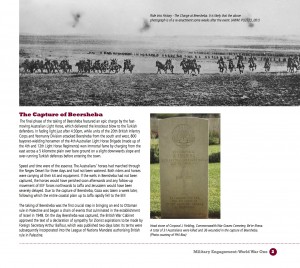
The Massacre of Beersheba
DFAT’s Pictorial Romance glorifies the capture of Beersheba, “knockout blow”, “immortal fame”, “charging from the east” and “declaration of sympathy for Zionist aspirations”. The Australian War Memorial depicts the battle as a heroic and pivotal event with no mention of any massacre – nor is there any mention of Israel, which did not exist, or Jews ,which numbered 15% of the native Arab population.
Beersheba is a biblical area in the Negev inhabited by Bedouins since the 10th century BCE, destroyed and rebuilt many times over the centuries.
John Docker explores the “remembering” of indigenous history in Australian culture and reveals the “heroic” myth and legend of Beersheba as a shameful and violent massacre. An old soldier from the battle confesses his dark and tortured memory of the massacre.
Read more on “massacres, actual, surrogate and averted” here…
Colony Club Votes in the United Nations
The United Nations General Assembly annually votes on a resolution titled, “Peaceful Settlement of the Question of Palestine.” This resolution uniformly includes necessary steps for “achieving a peaceful settlement of the question of Palestine” and a group of nations known as the CANZUS group with a few Pacific US dependencies routinely vote with Israel against the resolution – United States, Marshall Islands, Micronesia, Palau, Nauru, Canada and Australia.
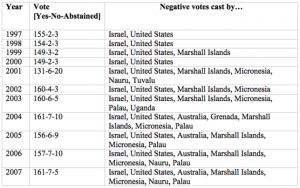
- “Affirming the principle of the inadmissibility of the acquisition of territory by war”;
- “Affirming also the illegality of the Israeli settlements in the territory occupied since 1967 and of Israeli actions aimed at changing the status of Jerusalem”;
- “Stresses the need for: (a) The realization of the inalienable rights of the Palestinian people, primarily the right to self-determination; (b) The withdrawal of Israel from the Palestinian territory occupied since 1967”;
- “Also stresses the need for resolving the problem of the Palestine refugees in conformity with its resolution 194 (III) of 11 December 1948.”
Read more from an article by Norman G Finkelstein on the Gandhi Foundation website…
Australia’s UN voting pattern on Middle East Resolutions
DECOLONIZATION, ATOMIC RADIATION, ISRAELI PRACTICES, AMONG OTHER TOPICS
Australia generally votes against Palestinian interests in favour of Israel, for example, in one Draft Resolution (A/62/405) on Israeli settlements in the Occupied Palestinian Territory, including East Jerusalem, and the occupied Syrian Golan, 165 countries voted in favour and the 7 against were :
- Australia
- Canada
- Federated States of Micronesia
- Israel
- Marshall Islands
- Nauru
- Palau
- United States
Read the full General Assembly text here General Assembly GA:10677 and more here Fourth Committee Forwards 28 Drafts to General Assembly For Adoption
United States and a Client State vote against resolution to end Israel’s Occupation of Palestine in 2017
On December 30, 2014, the UN Security Council resolution to set a date for the end of th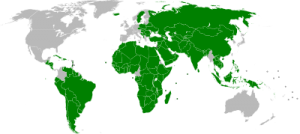 e occupation of Palestine was defeated with only Australia and the US voting against the resolution. Russia, China, France, Argentina, Chile, Luxemburg, Chad and Jordan voted for the resolution and the UK, Rwanda, Nigeria, Lithuania, and South Korea abstained. Countries coloured green in the world map already recognise Palestine.
e occupation of Palestine was defeated with only Australia and the US voting against the resolution. Russia, China, France, Argentina, Chile, Luxemburg, Chad and Jordan voted for the resolution and the UK, Rwanda, Nigeria, Lithuania, and South Korea abstained. Countries coloured green in the world map already recognise Palestine.
A Roy Morgan Research poll commissioned in November 2014 found
- 57% think Australia should vote yes in the UN to recognising Palestine (an increase of 6% since 2011)
- 8% suggest we should vote against an independent Palestinian state (a decrease of 7% since 2011)
The proposed resolution would have set a 2017 deadline for Israel to withdraw from the West Bank and Gaza – 50 years after first occupying the territories. It called for borders to be drawn up on 1967 lines with negotiated land swaps and for a “third party” to prevent a resurgence of terrorism.
US ambassador to the United Nations Samantha Power: resolution was “one-sided” and failed to take into account Israel’s legitimate security concerns.
Australia’s representative Gary Quinlan : text “lacks balance and seeks to impose a solution put forward by one party alone”.
In defending its position the Australian government stated that the resolution “.. lacks balance and seeks to impose a solution put forward by one party alone.”
“The United Nations General Assembly has adopted a number of resolutions saying that the strategic relationship with the United States encourages Israel to pursue aggressive and expansionist policies and practices. The 9th Emergency Session of the General Assembly was convened at the request of the Security Council when the United States blocked efforts to adopt sanctions against Israel.” Wikipedia has a list of the UN resolutions concerning Israel and Palestine here…
Jonathon Cook is a British journalist living in Jesus’ village Nazareth – here is his take on the failed Resolution “The US feels the heat on Palestine vote at UN”
Australia’s Foreign Minister, Julie Bishop, in an exclusive interview with The Times of Israel, asked whether she agrees or disagrees with the near-universal view that Israeli settlements anywhere beyond the 1967 lines are illegal under international law, replied: “I would like to see which international law has declared them illegal.” Full article by Raphael Ahren here…
Why exactly does Australia traditionally support Israel, despite that country’s continued defiance of UN resolutions? Ailsa Burns looks at some possible explanations in New Matilda

